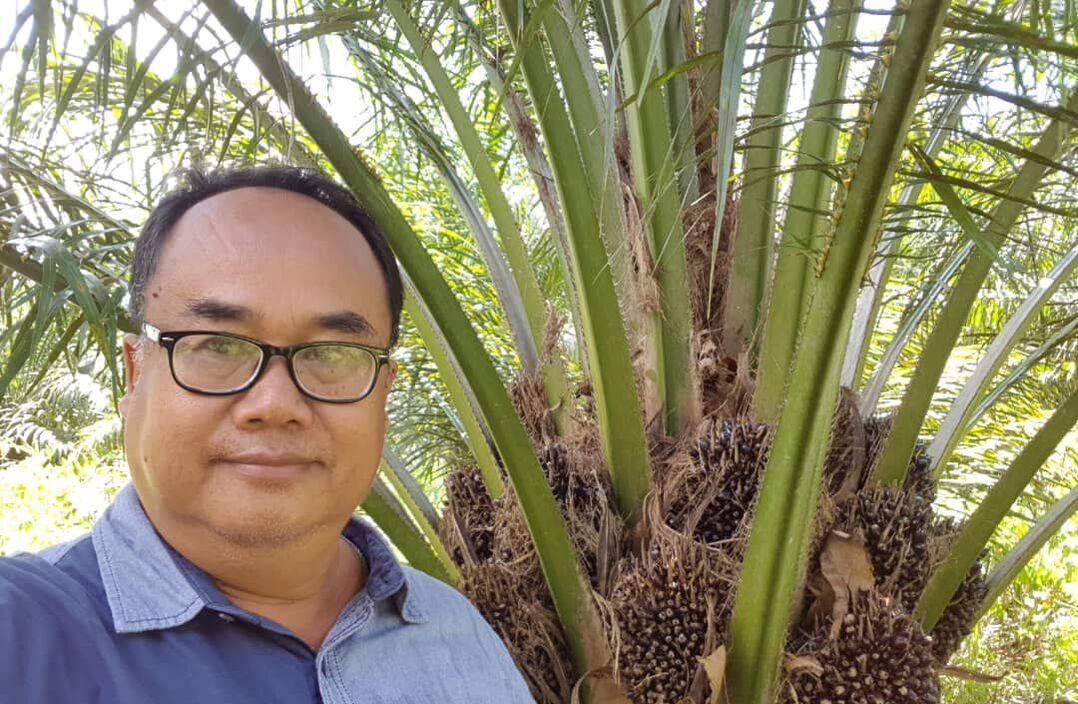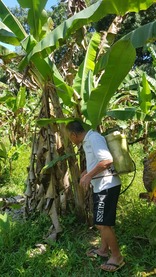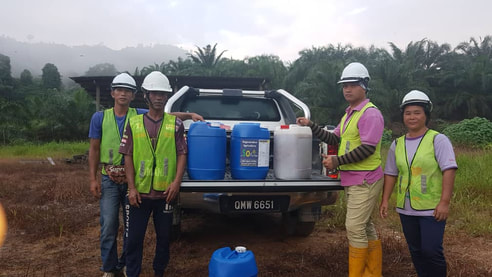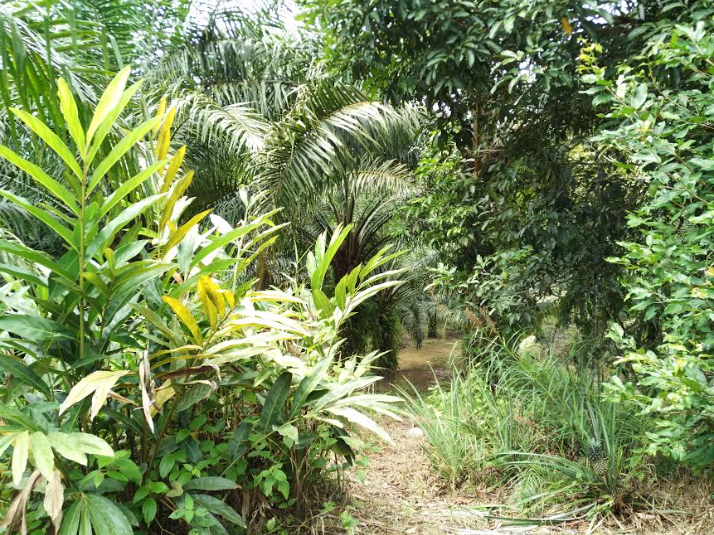Palm Oil Farmers Leading the Way to Organic Farming in Malaysia
Organic farming is making a come back to Malaysia, led not unsurprisingly by farmers who grow oil palm.
As one of the biggest agricultural crops in Malaysia, with easy access to buyers for their harvests, some 500,000 small farmers in Malaysia are now included in the Malaysian palm oil supply chain.
Malaysia has a rich history as a source of agricultural commodities to supply global demand. From its early days as a colony of the United Kingdom when it grew tea and rubber to its present day status as the second largest producer of palm oil in the world, the country’s exports have fed the global need for agricultural goods .
As one of the biggest agricultural crops in Malaysia, with easy access to buyers for their harvests, some 500,000 small farmers in Malaysia are now included in the Malaysian palm oil supply chain.
Malaysia has a rich history as a source of agricultural commodities to supply global demand. From its early days as a colony of the United Kingdom when it grew tea and rubber to its present day status as the second largest producer of palm oil in the world, the country’s exports have fed the global need for agricultural goods .
As the country developed in the past few decades, farming as a livelihood has fallen out of favor among the younger generation whose higher education is causing them to seek jobs away from the farm. It is not uncommon to hear tales of children selling off their ancestral farmlands to developers for housing projects as the younger generation find better livelihoods away from the harsh physical demands of the family farm.
It is in this setting that one oil palm farmer in Malaysia stands out.
Ugak Anak Sanggau ( Ugak son of Sanggau) is a Dayak oil palm farmer in the Sarawak state of Malaysia. His experience in the palm oil industry started as a worker and over 25 years, used his personal drive to become an estate manager towards the end of his professional career.
It is in this setting that one oil palm farmer in Malaysia stands out.
Ugak Anak Sanggau ( Ugak son of Sanggau) is a Dayak oil palm farmer in the Sarawak state of Malaysia. His experience in the palm oil industry started as a worker and over 25 years, used his personal drive to become an estate manager towards the end of his professional career.
 Ugak Sanggau, a Dayak farmer in Malaysia
Ugak Sanggau, a Dayak farmer in Malaysia
It was the same drive that got Ugak to look into making his own family farm more profitable as low prices for palm oil drove many farmers to abandon their farms to seek jobs as workers in other industries.
This report by Reuters on smallholders in Malaysia and Indonesia touches on the “survival crisis” of small farmers who cannot make a living. This extends not only to palm oil farmers but also to farmers in general. The Iban tribe of Sarawak was well known for their cultivation and supply of rice in Sarawak not that long ago. The sentiment these days among the Ibans is that it is easier to work for a salary and buy rice in the supermarket instead of growing one’s own and hope there is profit leftover to buy other necessities.
This report by Reuters on smallholders in Malaysia and Indonesia touches on the “survival crisis” of small farmers who cannot make a living. This extends not only to palm oil farmers but also to farmers in general. The Iban tribe of Sarawak was well known for their cultivation and supply of rice in Sarawak not that long ago. The sentiment these days among the Ibans is that it is easier to work for a salary and buy rice in the supermarket instead of growing one’s own and hope there is profit leftover to buy other necessities.
As prices for palm oil plummeted in recent years, Ugak used the knowledge from his professional experience and identified the costs of fertilizers and pesticides as the only variable he could take on to try and find profit from his farm.
The typical expenses for a small oil palm farmer are in farm maintenance, harvest and transport. These three activities average MYR150 ( USD$38 )per hectare per month. When the average price for Crude Palm Oil is MYR2100 ( USD$525 ) per ton, the mills will offer an average of MYR380 ( USD$95 ) per ton for Fresh Fruit Bunches. With an average yield of 1.5 tonnes per hectare, the small farmer can expect to net MYR345 per hectare every month. With the average size of a small holder farm at 5 hectares, it's little wonder then, that so many small farmers have abandoned the family farms to seek salaried work.
Ugak began experimenting with different methods of making his own fertilizer in 2017 and finally settled on liquid organic fertilizers made from his own farm and kitchen wastes. The early efforts used small buckets to hold the organic mix which was tested on his own oil palm farms. His enthusiasm for organic farming shows as he points out the results of dark green leaves, more fruit bunches and the presence of earthworms to improve the soil condition naturally without added cost.
Despite great harvests from his own farm, Ugak faced resistance when he tried to sell his fertilizer to other small farmers. The farmers who are used to buying imported fertilizers from big companies with commercial packaging were not convinced that a liquid organizer made from green wastes could work.
The typical expenses for a small oil palm farmer are in farm maintenance, harvest and transport. These three activities average MYR150 ( USD$38 )per hectare per month. When the average price for Crude Palm Oil is MYR2100 ( USD$525 ) per ton, the mills will offer an average of MYR380 ( USD$95 ) per ton for Fresh Fruit Bunches. With an average yield of 1.5 tonnes per hectare, the small farmer can expect to net MYR345 per hectare every month. With the average size of a small holder farm at 5 hectares, it's little wonder then, that so many small farmers have abandoned the family farms to seek salaried work.
Ugak began experimenting with different methods of making his own fertilizer in 2017 and finally settled on liquid organic fertilizers made from his own farm and kitchen wastes. The early efforts used small buckets to hold the organic mix which was tested on his own oil palm farms. His enthusiasm for organic farming shows as he points out the results of dark green leaves, more fruit bunches and the presence of earthworms to improve the soil condition naturally without added cost.
Despite great harvests from his own farm, Ugak faced resistance when he tried to sell his fertilizer to other small farmers. The farmers who are used to buying imported fertilizers from big companies with commercial packaging were not convinced that a liquid organizer made from green wastes could work.

Firm in the belief that this was the way to increase profits for farmers, he continued to make cold calls to farmers in his hometown in Miri, Sarawak. Confident that liquid organic fertilizers could bring down costs and increase yields, he selected farms that grew bananas and pepper to prove that it would work not only for oil palm. He even went to the extreme of offering these farmers free fertilizers to convince them it would work.
Ugak estimated that the farmer could save MR1000 per hectare annually if they used his fertilizer instead of the commercial brands. On top of savings on the costs of fertilizer, his experience showed an increased yield of 20% as quickly as six months after using his organic fertilizer. These are important numbers to a farmer in Sarawak as they prove that working on their own farms can provide a better living than working as a laborer.
Ugak estimated that the farmer could save MR1000 per hectare annually if they used his fertilizer instead of the commercial brands. On top of savings on the costs of fertilizer, his experience showed an increased yield of 20% as quickly as six months after using his organic fertilizer. These are important numbers to a farmer in Sarawak as they prove that working on their own farms can provide a better living than working as a laborer.
Two years on, Ugak has given his home made fertilizer a name, Super Organic Fertilizer and packaged it professionally with a printed label and instructions on its application.
Super Organic Fertilizer has grown a following of farmers who swear by the product. Oil palm farmers are reporting lush green growth and heavier harvests. Other farmers who used it on their fruits and vegetables report the same results as their farms produced harvest they had never seen before. The increased demand led to a bigger production of liquid organic fertilizers which are now produced in bins that could hold a hundred litres at a time. Ugaks early concerns about having enough green wastes to supply bigger demand was quickly solved by collecting green wastes from local farmers markets.
This holds great potential for Sarawak’s smallholders who have neglected their oil palm farms since bigger harvests at reduced costs mean their farms could actually provide a living profit.
The use of organic fertilizers in Malaysia’s oil palm plantations is not new as it is widely available to farmers but the costs are higher than chemical fertilizers. The results from commercial organic fertilizers have been reported as inadequate justification for the higher costs. With a cost lower than chemical fertilizers and labor savings from its application through a spray pump, Ugak’s boldly named Super Organic Fertilizer is gaining popularity among Sarawak’s farmers. The most notable achievement to date is the approval of a medium sized oil palm plantation, Persafe Plantation in Limbang, Sarawak, which at 560 hectares, has approved the use of his organic fertilizer.
Super Organic Fertilizer has grown a following of farmers who swear by the product. Oil palm farmers are reporting lush green growth and heavier harvests. Other farmers who used it on their fruits and vegetables report the same results as their farms produced harvest they had never seen before. The increased demand led to a bigger production of liquid organic fertilizers which are now produced in bins that could hold a hundred litres at a time. Ugaks early concerns about having enough green wastes to supply bigger demand was quickly solved by collecting green wastes from local farmers markets.
This holds great potential for Sarawak’s smallholders who have neglected their oil palm farms since bigger harvests at reduced costs mean their farms could actually provide a living profit.
The use of organic fertilizers in Malaysia’s oil palm plantations is not new as it is widely available to farmers but the costs are higher than chemical fertilizers. The results from commercial organic fertilizers have been reported as inadequate justification for the higher costs. With a cost lower than chemical fertilizers and labor savings from its application through a spray pump, Ugak’s boldly named Super Organic Fertilizer is gaining popularity among Sarawak’s farmers. The most notable achievement to date is the approval of a medium sized oil palm plantation, Persafe Plantation in Limbang, Sarawak, which at 560 hectares, has approved the use of his organic fertilizer.
 Super Organic Fertilizer at Persafe Plantation Sdn Bhd in Sarawak
Super Organic Fertilizer at Persafe Plantation Sdn Bhd in Sarawak
Ugak’s venture into producing organic fertilizers for the palm oil industry in Sarawak is paving a path for the reduction of the industry’s environmental impact. Unlike the new calls for environmentally friendlier farming practices to save biodiversity in Europe, Ugak’s venture was driven not by environmental concerns but a need to find a way for the small farmer in Sarawak, to make a decent living.
The environmental benefits of his venture which include the protection of water quality in rivers from harmful agricultural chemical runoffs or the decrease of carbon emissions from recycling green wastes from farmers markets were simply an unintended consequence for conservation
The environmental benefits of his venture which include the protection of water quality in rivers from harmful agricultural chemical runoffs or the decrease of carbon emissions from recycling green wastes from farmers markets were simply an unintended consequence for conservation
This positive consequence may soon find its way to supermarkets in the European Union as the implementation of blockchain technology for transparency by the Malaysian Palm Oil Council traces the palm oil supply chain in Malaysia.
For the moment, as demand for his Super Organic Fertilizer grows among farmers in Sarawak, we will be documenting their progress to support Ugak Sanggau’s drive to green up Sarawak’s agricultural products.
Published June 2020, CSPO Watch
For the moment, as demand for his Super Organic Fertilizer grows among farmers in Sarawak, we will be documenting their progress to support Ugak Sanggau’s drive to green up Sarawak’s agricultural products.
Published June 2020, CSPO Watch
Update August 01, 2020 - KUCHING: Malaysia’s crude palm oil (CPO) production staged an impressive recovery of 35 per cent in the second quarter of the year (2Q20), led by Peninsular Malaysia and Sabah.
The team Kenanga Investment Bank Bhd (Kenanga Research) observed that Peninsular Malaysia and Sabah anchored the bulk of it, rising by 40 and 36 per cent respectively. BorneoPost
The team Kenanga Investment Bank Bhd (Kenanga Research) observed that Peninsular Malaysia and Sabah anchored the bulk of it, rising by 40 and 36 per cent respectively. BorneoPost
UPDATE JULY 17, 2020 - News report from Sarawak shows that many smallfarmers cannot even earn MYR1000 per month. This supports our own findings which is why the organic fertilizer project with Ugak Sanggau is so important to helping these rural farmers to make a living income from farming. We are collecting more information on small farmers and how Ugak has been able to help them. In the meantime, the news report from Sarawak can be read here.

